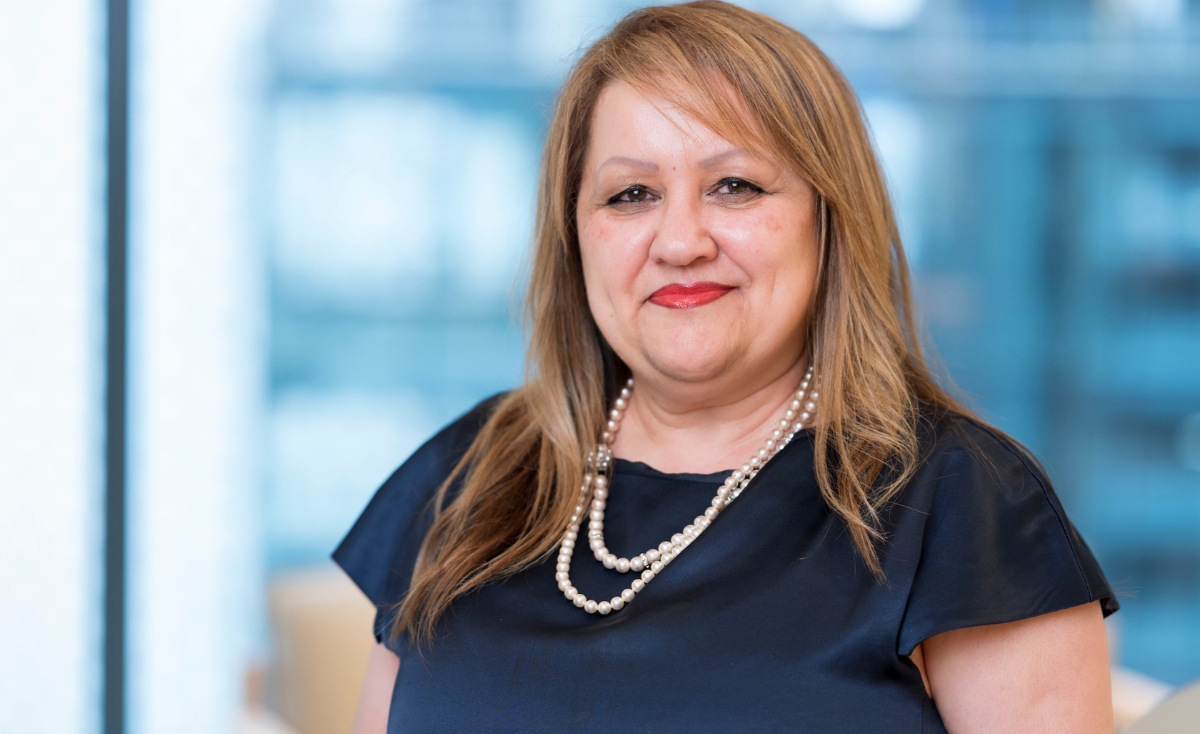 Lounarda David, Chief Operating Officer, IFM Investors.
Lounarda David, Chief Operating Officer, IFM Investors.
Andrew Putwain: Can you describe your role, background, and the company you work for – its ethos, place in the market, and your day-to-day duties?
Lounarda David: As the Chief Operating Officer (COO) of IFM Investors, I am responsible for managing all facets of IFM Investors’ operations (back office and middle office), as well as valuation, outsourcing providers, due diligence and external audit assurances, data governance, IT, business transformation and continuous improvement.
I am also responsible for our clients’ performance analytics, financial, taxation, and regulatory reporting. I have over 35 years of global industry experience, including 14 years at Mercer Investment Consulting as the APAC Director of Sentinel and also a Mercer Global Partner. Prior to joining IFM Investors, I was the Chief Investment Operations Officer at Sunsuper (now under Australian Retirement Trust) and a member of its enterprise leadership team.
"My day-to-day duties are impossible to define as it will depend upon the
strategic priorities of the firm, and the external environment."
IFM Investors is a ‘purpose’ driven global and investor-owned asset manager. It was formed in 1990 by a collective of industry superannuation funds, with the purpose to invest, protect, and grow the long-term retirement savings of working people. We operate from 11 offices and manage around AU$220 billion (£114.5 billion) of assets across four asset classes including Infrastructure Equity, Debt, Private Equity and Listed Equity. Our clients are global and like-minded institutions, ranging from superannuation and pension funds to sovereign wealth funds, insurers, endowments, foundations and universities.
My day-to-day duties are impossible to define as it will depend upon the strategic priorities of the firm, and the external environment. But, at any given time, I will be helping ensure IFM Investor’s global operations and technology not only meets our clients’ and their internal requirements, but also considering how it needs to evolve over time and remain a differentiator for our business. I also make sure we deliver on our global regulatory and contractual obligations. To do this, all aspects of the Global Operations and Technology Group must be running harmoniously.
Andrew: IFM Investors is Australia-based with a global footprint; what does working for such a large organisation mean for your role? Is there anything that separates it from other roles in financial companies? (i.e. due to its size or location, etc.)
Lounarda: Most of my career, I have worked for large global organisations where you had to manage the business over different time zones and geographies. IFM Investors is an Australian organisation, with 11 offices around the globe, and clients in a number of jurisdictions. So, working to ensure consistency of culture, processes, controls, service levels, and technology is extremely important.
"We always endeavour to stay ahead of regulatory demands, but this is still a significant driver of work within our business."
The biggest is ensuring compliance with global regulators. We have built a risk culture at IFM, which gives us a solid foundation when approaching a new jurisdiction. We always endeavour to stay ahead of regulatory demands, but this is still a significant driver of work within our business, particularly for my team and for my colleagues in the Risk & Compliance team.
One of our differentiators – both for the talent we attract and for our clients – is our purpose to invest, protect, and grow the long-term retirement savings of working people.
Andrew: IFM focuses a lot on infrastructure; what does this mean from an operations perspective? For example, more complexity, more long-term planning, more focus on regulatory compliance, etc.? And how does this affect your role?
Lounarda: It is well accepted in the industry that private markets products are much more complex to manage from an operational, technology, and regulatory perspective. Around 70% of the assets we manage are private assets across infrastructure equity, debt and private equity investments. But our flagship products are Infrastructure products, so this has worked in our favour as it has forced us to proactively look to address the challenges and risks inherent in supporting private market products.
"The other area of my focus has been to continue to drive a risk aware and
improvement culture, so that we remain agile and able to evolve."
In 2018 when I joined, I embarked on a transformation program known as the Greenwich Program that was designed to enhance our operating platform and technology to support the organisational footprint and our growth aspirations. One of the outcomes of this Program was the implementation of a single multi asset class and integrated portfolio management & investment risk platform for both our public and private market assets. This platform, combined with a significant uplift in our investment data capability and governance enabled us to significantly increase our automation and efficiency, whilst also reducing costs and operational risks. This has helped us reduce complexity in the operation of our private market assets, while also enabling us to respond more efficiently to increased regulatory requirements.
The other area of my focus has been to continue to drive a risk aware and improvement culture, so that we remain agile and able to evolve. We want to be well prepared for the future. A good example is our recent implementation of an Artificial Intelligence (AI) Ethics Policy supported by an AI Assurance Framework. This gives us the tools to lean into AI opportunities as they present, without compromising on IFM’s values, and in a manner that means IFM will likely be well placed by the time global AI regulations are released.
Andrew: Can you discuss regulatory compliance in more detail around what you’re seeing, especially about the IFM’s place in/around Australia’s famous super system?
Lounarda: IFM’s Australian superannuation clients have always been subject to ongoing regulatory rules; however in the last four years, these have become particularly wide reaching. Changes like Your Super Your Future, the APRA Annual Performance Test, Design & Distribution Obligations, Portfolio Holdings Disclosure, and the Retirement Income Covenant all speak to the increased maturity of the industry. Whilst IFM Investors is not APRA regulated, we recognise the obligations our superannuation fund owners and clients face and do our best to meet their requirements, wherever possible.
We don’t expect these changes or updates to regulation to stop. It is worth noting, however, that some of the new regulations are modelled off the European model - such as the EU’s GDPR - and so we are able to look to global regulatory markets to appreciate what may come next.
Andrew: What changes are you seeing in the market? More compliance, regulatory burden, the rise of artificial intelligence (AI), etc.? And what are you expecting to change over the next few years?
Lounarda: I am seeing several changes in the market that provide opportunities for organisations that are proactive and prepared. Conversely, those who jump in without caution will likely have a bumpy road ahead.
The private markets industry is having its day in the sun. Investors across the board are recognising the benefits of these asset classes and are facing the challenges of attempting to administer them. I would expect more players offering products in this area, and more investors seeking long term stable returns.
I expect rapid adoption of AI technology with inconsistent success. Those organisations that have invested in data governance and have defined their AI strategy, alongside supporting assurance frameworks and proper risk management processes should be able to leverage AI technology to create opportunities, whilst staying in line with expected global regulations. Those that have not laid a strong foundation for AI will most likely fall behind the market as significant time is spent in catching up.
"Cyber security has never been more important with cyber criminals expected to lead the charge of AI usage to identify new ways to commit fraud and attack systems."
As Australian superannuation funds grow, they are investing more in overseas markets. This makes sense and is understandable as they seek to deliver the best returns they can for their members. There are, however, significant costs involved in setting such systems up, including meeting global regulatory requirements that come with such expansion.
Lastly, cyber security has never been more important with cyber criminals expected to lead the charge of AI usage to identify new ways to commit fraud and attack systems. Whilst organisations are already well advanced in their cyber security resilience programs and preparedness, it is worth noting the Digital Operational Resilience Act (DORA) that applies to entities in the EU. This regulation will apply from 2025 and is aimed at strengthening the IT security of financial entities in case of a severe operations disruption.
Andrew: Can you give us your best practical day-to-day advice for those working in operations; what are some of the lessons you’ve learned, for example, or what are the golden rules you work by?
Lounarda: The best bit of advice I can give is to do everything you can to build a strong team and a strong team culture: it fosters collaboration, innovation, and resilience in the face of challenges.
When it comes to operations, efficiency, forward thinking, flexibility and change management are key. Never underestimate the importance of process optimisation, always look for ways to streamline and improve workflows, and investing in technology and training can significantly enhance productivity and accuracy. Put time and effort into building a robust data governance framework and oversight model to increase efficiency, analytical insight and technology optimisation.
Communication is also key – maintaining clear and open communication across all levels of an organisation pays long-term dividends and is a major driver in making sure any changes can be implemented smoothly.
Please Sign In or Register to leave a Comment.
SUBSCRIBE
Get the recent popular stories straight into your inbox







